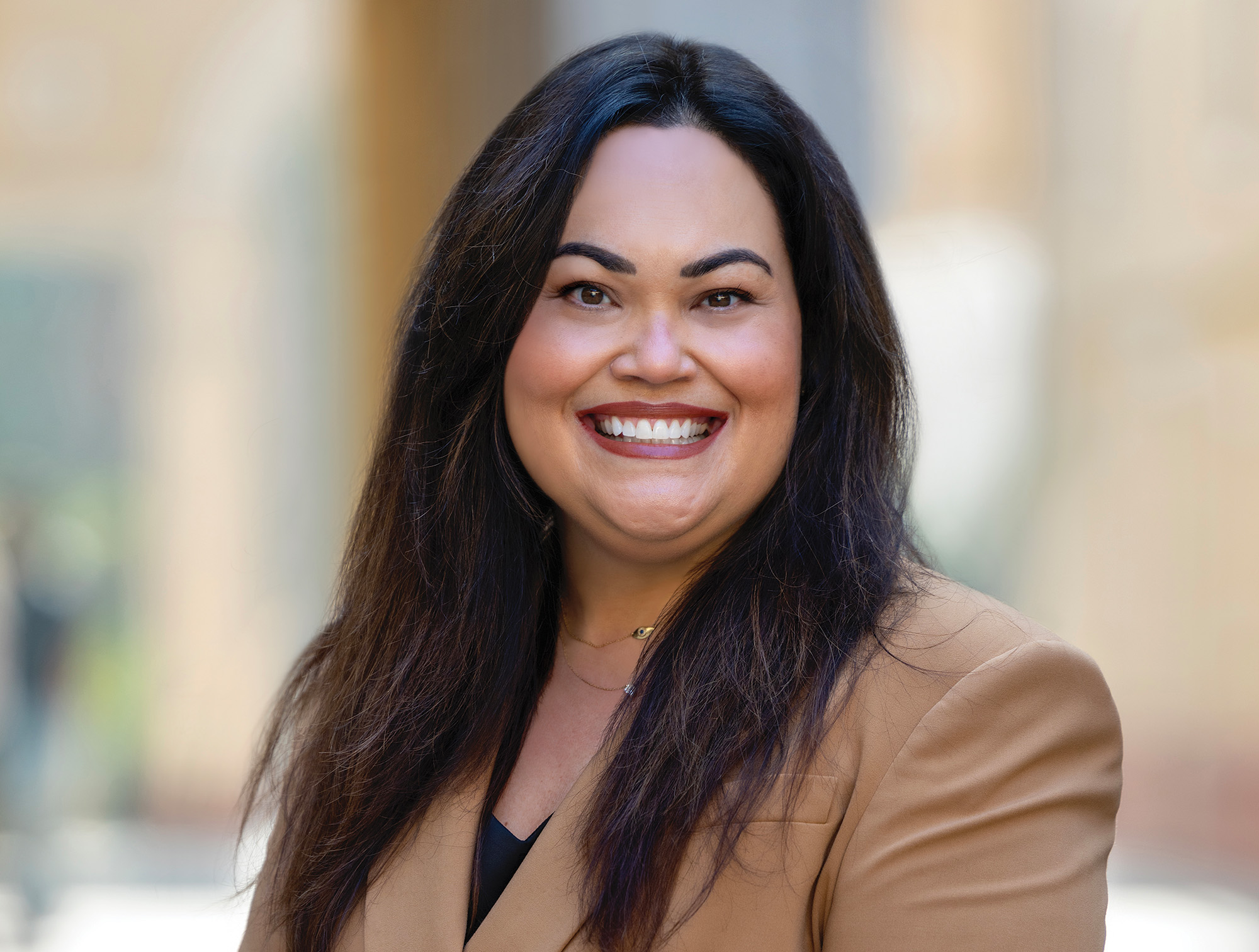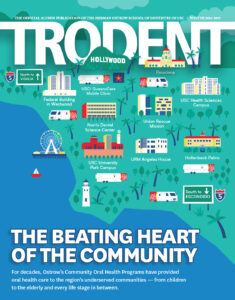
BACK TO SCHOOL
When recent graduate Maya Fulcher first decided to get her master of science degree in community oral health, she wanted to transition back into teaching. Little did she know that the degree would help her create a new career trajectory bringing oral health support to elderly communities.
BY MOLLY M. KRUSE
LONGTIME DENTAL HYGIENIST MAYA FULCHER DH ’03, MS ’24, initially wanted to return to school for a master’s degree so she could teach. But, as she advanced through her online master’s program, she carved out a completely different career trajectory — one that alchemizes difficult past experiences and allows her to give back.
Fulcher had worked as a dental hygienist for nearly 20 years when she reached a turning point. She had stepped away from additional part-time work as a clinical instructor when her husband, and then father, became critically ill and needed care.
“So, life kind of took a different turn,” Fulcher recalls. “And two years ago, I thought about it. I thought, ‘Do I still want to stay in private practice, or what do I want to do?’”
After hearing about the master of science degree in community oral health — offered through Ostrow’s Online Dental Programs — Fulcher made her decision: It was time to return to school.
As she began the program’s first assignments, Fulcher started to discover her true purpose — providing dental care for underserved communities, specifically elderly people in care facilities.
Born out of Personal Experiences
Fulcher’s interest in the topic came straight from personal experience: She had acted as a caregiver for her father, who had Parkinson’s disease. When he became wheelchair-bound, she and her mother needed extra support, so they placed him in a long-term care facility.
“I realized that all those caregivers were wonderful,” Fulcher says. “They were lovely. But they weren’t formally trained in oral hygiene or oral health.”
Fulcher took it upon herself to provide the caregivers with training on oral health and realized they were “so open to learning,” she said. It was clear that such training was an unmet need for caregivers working with the elderly.
The experience stayed with Fulcher, and, while writing her first report for the master’s program, she researched the issue of oral care for elderly people in long-term care. She found that her experience was common: There is an influx of people entering long-term care facilities that are often under-equipped to provide proper dental care.
The program Fulcher chose was uniquely qualified to help her tackle such a problem. The master of science degree in community oral health teaches students how to reach and empower disadvantaged communities who are not receiving proper dental care. It is basically “public health, but with a dental focus,” Fulcher says.
“Our program was all about community oral health for vulnerable populations … how to assess them, how to figure out what their needs are, work with them and then how to implement an intervention to help that community,” she explains.
Filling an Unmet Need
For her final project, Fulcher put what she had learned into practice by creating an oral hygiene education program for caregivers at a long-term care facility. Her goal was to see if such a program would be useful in a real-world setting.
The facility Fulcher chose for her project was especially in need of help: 80 percent of its residents were on federal subsidies, and the owner was purchasing all the residents’ oral hygiene aids out of pocket.
“And so, I thought, oh my gosh, they’re in need, you know?” Fulcher recalls. “I created this whole program: I did … [an] oral health literacy check before I did the program, and I did one after, and I took all of the data and put it in charts and reports, and I did a whole 51-page scientific report on it.”
Beyond her capstone project, Fulcher was also able to solicit donations to help the facility, including toothbrushes, toothpaste, floss and denture cleaner.
Connecting with Mentors
Fulcher’s master’s degree journey also inspired her to apply for another program to expand her dental hygiene license — the registered dental hygienist in alternative practice (RDHAP) credential — that will qualify her to treat patients in nursing homes. And, in the spirit of her final project, Fulcher also plans to create an oral health training program for caregivers at nursing homes and long-term care facilities.
Even though her master’s classes were online, Fulcher says she “went beyond the screen” to connect with fellow Trojans. One of Fulcher’s former dental hygiene professors encouraged her to join the California Dental Hygienists’ Association, where she is now the Los Angeles trustee. And when she organized her first oral cancer awareness walk for the Los Angeles Dental Hygienists’ Society, Fulcher invited her professors to come out and support the cause.
“The highlight has really been making connections with mentors and people in my field who are encouraging me to expand my career, and helping me find different directions,” Fulcher says. “That never would have happened if I wouldn’t have joined this program.”
